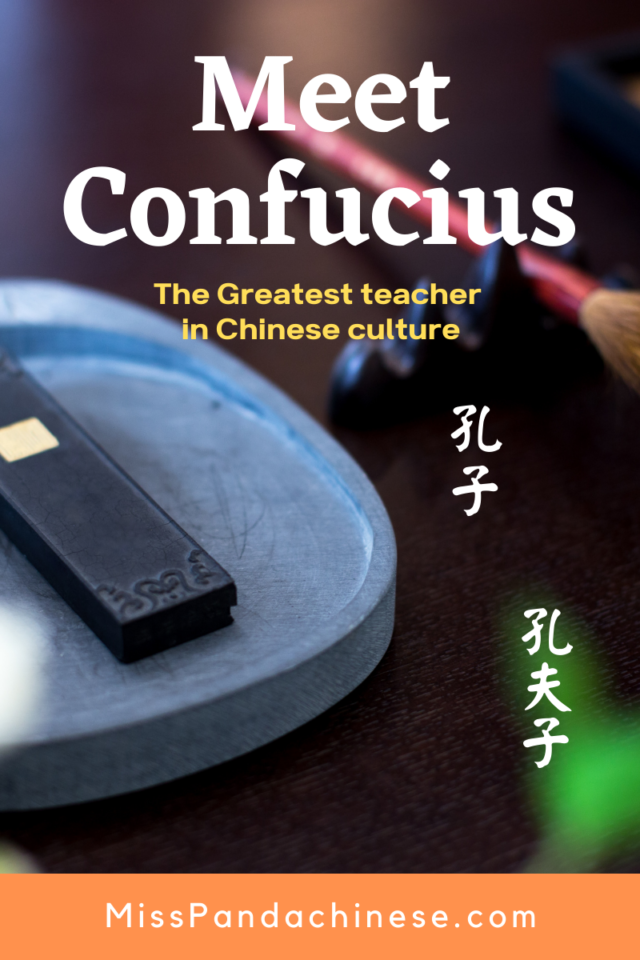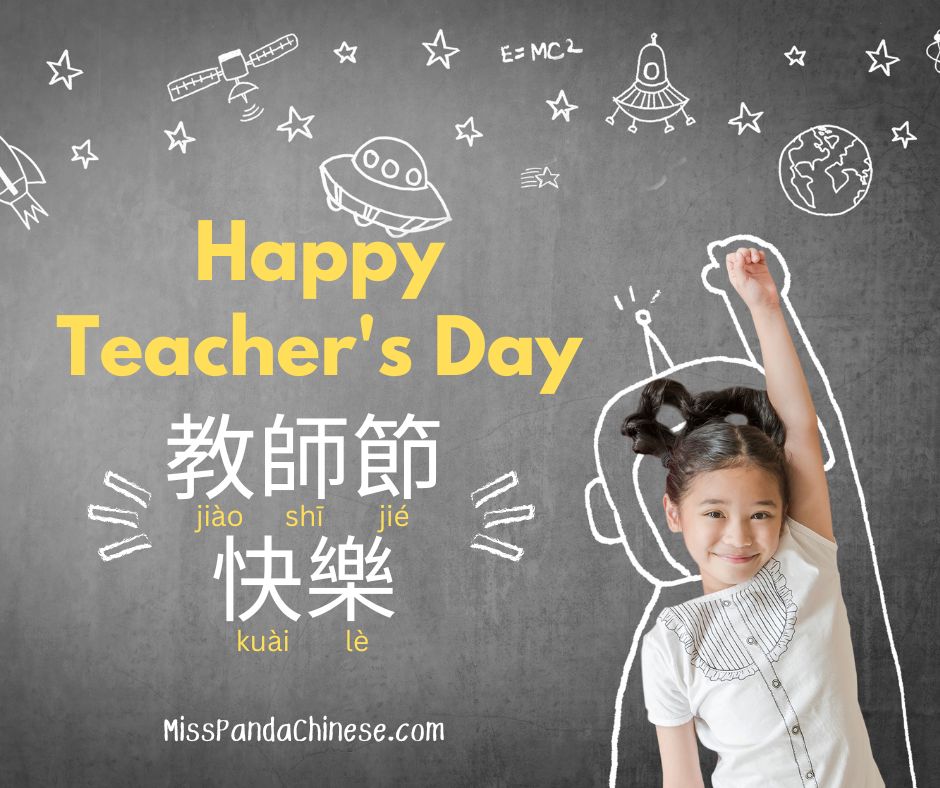
Meet Confucius to Celebrate Teacher’s Day!
Confucius 孔子 (Kǒng zǐ) is the greatest teacher 至聖先師 (TC – Traditional Chinese)| 至圣先师 (SC – Simplified Chinese) in Chinese culture! Confucius wasn’t just a teacher; he was also a sage and philosopher. His teachings are not a religion but a guide on how to learn, be a kind person, and lead others—whether in the family, community or even as a leader of a country. For people who are curious about the core of Chinese culture parents, learning about Confucius means discovering and connecting with the principles that shaped Chinese culture and values.
Teacher’s Day: Honoring Educators with Confucius for Kids
When is it?
In China, Teacher’s Day is celebrated on September 10, and in Taiwan, it’s celebrated on September 28—Confucius’ birthday. In Chinese, it’s called jiào shī jié (教師節 / 教师节), which directly translates to “Teacher’s Day.”
What do we call our teachers?
Chinese children call their teachers lǎo shī (老師 / 老师). However, just like in English, where we say “Mrs. Wang,” in Chinese, we say “Wang Laoshi” (王老師 / 王老师), meaning “Wang Teacher.” Using someone’s title, like “teacher,” is an important part of showing respect in Chinese culture.
How can we celebrate?
This is a wonderful day to appreciate all the educators in our lives—whether they are in the classroom, teaching at home, or guiding us through the world around us. Sharing the story of Confucius for kids can make Teacher’s Day more meaningful, helping children understand why we honor teachers.
Quick Facts about Confucius
- Confucius is known as the greatest teacher, sage, and philosopher in Chinese culture.
- He was born in 551 B.C.E. in Qufu, China, and passed away in 479 B.C.E.
- The book of his teachings is called the Analects (論語 / 论语), or Lún yǔ.
- The core of his teachings focuses on benevolence, called 仁 (rén), which focuses on kindness, compassion, and empathy.
- Confucius wanted his students to become 君子 (jūn zǐ)—gentlemen who are wise, fair, and kind.
Who Was Confucius?
Confucius is known to Chinese children as 孔子 (kǒng zǐ) or 孔夫子 (kǒng fū zǐ), with his formal name being 孔丘 (kǒng qiú). He lived during the Spring and Autumn period (春秋時期 / 春秋时期) in Chinese history, a time filled with great change and growth. Even though he came from a poor background and lost his father when he was very young, Confucius developed a deep love for reading, and learning about etiquette.
Confucius never held a high-ranking government position, but his influence spread widely through the thousands of students he taught. His teachings on respect, kindness, and wisdom left a lasting impact on Chinese culture and society. Introducing Confucius to kids opens a window for children to learn about important cultural values and history.
Confucius’ Teachings: Lessons for Life
Confucius’ teachings are all about developing strong moral character and good habits, ideas that are as valuable today as they were thousands of years ago. Here are five of his core teachings, easily relatable for kids:
1. Be Kind (仁 / rén)
One of the most important things Confucius taught was rén (仁), benevolence which consists of kindness, caring, and compassion for others. He believed that everyone should treat each other with care, whether it’s family, friends, or strangers.
Daily practice prompt for parents and educators:
Ask children, “What is kindness? Have them share a story about themselves or their friends being kind.” Encourage them to share a toy, help a friend, or simply say “thank you.” Teaching Confucius to kids helps them see that small acts of kindness can make a big difference.
2. Be a Gentleman (君子 / jūn zǐ)
Confucius wanted his students to be jūn zǐ, which means being gentlemen, kind-hearted, and respectful. A gentleman (/lady) according to Confucius is honest, respectful, and always does what’s right—even when it’s hard. They are role models in the community.
Daily practice prompt for parents and educators:
Share stories of role models who embody the qualities of a jūn zǐ. Discuss how they can practice these qualities by being helpful, telling the truth, and showing respect to everyone around them.
3. Love Learning
Confucius was a lifelong learner. He encouraged students and people to keep exploring, ask questions, and never stop seeking knowledge. He believed that even if you make mistakes, it’s a great way to learn and grow.
Daily practice prompt for parents and educators:
Promote curiosity by exploring new things, reading together, and encouraging children to ask questions. Learning about Confucius for kids can spark discussions about growth, exploration, and the joy of discovering new things.
Meet Little Bun (Simplified Chinese version) • Meet Little Bun (Traditional Chinese version)
Confucius’ Legacy Today
Confucius’ teachings have been passed down for over 2,500 years, and they continue to shape the way people think about life, education, and society. His influence can be seen in schools and ceremonies throughout China, Taiwan, and many Asian countries – many of his principles—like respect, kindness, and love of learning — are universal.
For families learning about Chinese culture and language, introducing the wisdom of Confucius for kids is a wonderful way to connect with traditions and deepen their understanding of Chinese values. It’s also an opportunity to talk about core values in the community culture, and world culture represented at home/classroom, such as kindness, fairness, and learning.
Ways to Celebrate Confucius for Kids and Teacher’s Day
- Read Stories Together:
Read Ming’s Adventure with Confucius as a family/class. This is a bilingual book in English and Chinese. Stories are a great way to bring his wisdom to life and spark meaningful conversations. - Appreciate Teachers:
Encourage kids to write a thank-you note or design this thank-you card (in Chinese) for their teacher. This not only shows gratitude but also deepens their respect for educators. - Practice jūn zǐ Values:
Discuss with your children/students about ways that they can practice being respectful, honest, and kind. Share real-life examples and stories to facilitate ideas on how kids can model these values in school, at home, and in their community.
Exploring Confucius for kids means sharing timeless wisdom that inspires growth, respect, and kindness. Want to explore further? Here is extended Learning about Confucius.

